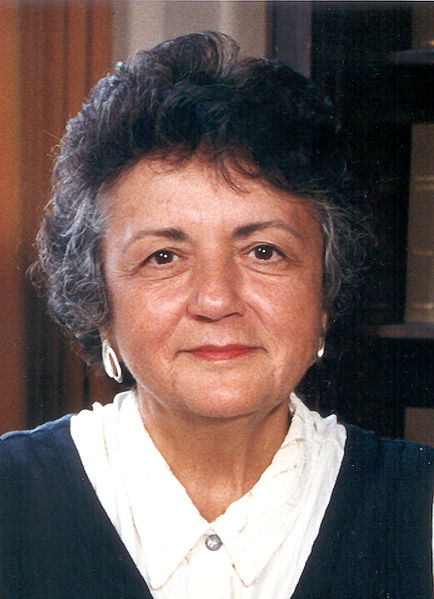Will Voters End Era of “Shirley’s Court”?
Shirley Abrahamson has been chief justice for 19 years, but controversial referendum question could end her reign.
The late Supreme Court Justice Bill Bablitch was furious. It was 1996, and the court’s new chief justice, Shirley Abrahamson, had canceled all but one of the justices’ subscriptions to the Wisconsin State Journal, Madison’s morning newspaper. All seven justices can’t – and shouldn’t – have to share one State Journal subscription, Bablitch fumed. It was before the internet rearranged our lives and habits.
Abrahamson’s action had an implicit message, telling her fellow justices to get the morning paper delivered at home – and why waste time reading it at work? It was an example of the tight control that Abrahamson, a justice for almost 39 years and chief justice for almost half of that time, has exercised on the seven-member court. Bablitch, who died in 2011, wasn’t the only justice to chafe at decisions unilaterally made by Abrahamson.
Tomorrow, the chief justice may pay a price for it being “Shirley’s court” for nearly 19 years (she became chief justice in August, 1996). Republican legislators, who have chafed at what they consider Abrahamson’s liberal views, twice pushed through legislative sessions a simple constitutional change: The chief justice will be elected for two-year terms by a majority of the justices.
This would amend the constitution, which now says the longest-serving justice is automatically the chief justice.
On Tuesday, the voters – although only about one in five is expected to go to the polls – will decide whether the seniority rule should be scrapped. If they approve it, thanks to the court’s four-justice conservative majority, Abrahamson will quickly become ex-Chief Justice and probably will be replaced by conservative Justice Pat Roggensack.
But that’s not the only court-related issue facing voters tomorrow. They will also decide whether Abrahamson’s chief court ally, Justice Ann Walsh Bradley, deserves a third 10-year term on the court. She is being challenged by Rock County Circuit Court Judge James Daley.
Bradley and Daley debated four times, and the race has been adequately covered by news organizations. Much, much less has been written – and said – about the constitutional amendment that would let the justices pick the next chief justice.
Although Republican legislators sniff that their proposed change isn’t a personal snub of Abrahamson, it is. But, in 39 years on the court, she’s seen almost everything – and made some mischief of her own – so she can’t be too surprised at this new attack. She once had furniture in the Supreme Court chamber moved for an exercise session, after all.
Besides being the longest-serving chief justice Wisconsin history, Abrahamson is also an historic figure in Wisconsin: First woman to serve on the Supreme Court and, when she was appointed in 1976, the only woman judge in Wisconsin. She was only the third woman judge in Wisconsin history.
“We shouldn’t eliminate our cherished right to elect our chief judge in an attempt to ‘change the referee’,” said Ann Jacobs, a Milwaukee lawyer who is president of the Wisconsin Association for Justice, in an op-ed newspaper article. The Association used to be called the Wisconsin Academy of Trial Lawyers.
But Rick Esenberg, president of conservative-leaning Wisconsin Institute for Law and Liberty, said in another op-ed that the current system “anoints” the longest-serving judge as chief, without consideration of their qualifications.
Esenberg also referred to the painful personal and philosophical fractures on the court. The four conservatives – Justices Roggensack, David Prosser, Annette Ziegler and Michael Gableman – routinely question, dispute and block the initiatives of Abrahamson and Bradley. Justice Pat Crooks, who will not seek re-election next year, painfully tries to straddle the divide.
“A chief justice can only lead with the consent and confidence of her colleagues,” Esenberg added. “If that is lost, the court is likely to descend into division and dysfunction. Our current method of selecting a chief provides no way for the court to correct such a situation.”
In a WisconsinEye interview, Esenberg said it is “likely” that Roggensack would be the next chief justice, if voters approve the amendment. Prosser is the most senior member of the conservative bloc, but he has an unresolved ethics complaint pending against him.
Last week, the state’s largest business group, Wisconsin Manufacturers and Commerce, reported that it will spend $600,000 to pass the amendment. Why?
WMC decided that “this change will advance our agenda,” Jacobs said.
Steven Walters is a senior producer for the nonprofit WisconsinEye public affairs channel. Contact him at stevenscwalters@gmail.com
The State of Politics
-
A Wisconsin Political Trivia Quiz
 Dec 15th, 2025 by Steven Walters
Dec 15th, 2025 by Steven Walters
-
The Fight Over Wisconsin’s House Districts
 Dec 8th, 2025 by Steven Walters
Dec 8th, 2025 by Steven Walters
-
The Battle Over On-Line Betting
 Nov 24th, 2025 by Steven Walters
Nov 24th, 2025 by Steven Walters























“WMC decided that “this change will advance our agenda,” Jacobs said.”
Wow Bruce, that really drives home the point that this is driven by special interests. Almost enough to make me forget that the source for this quote is from a trial lawyer in an op-ed piece (in an unnamed, unlinked newspaper), and not anyone associated with WMC in any way.
I love the “Vote Yes” TV spots that talk about freedom & democracy, etc. and basically assert that there is no issue of greater importance in all the world.
What has happened to the once respected and admired Wisconsin Supreme Court under the Republican corporate cabal that currently constitutes the majority is disgusting. Here is a safe rule of thumb:. If Wisconsin Manufactures and Commerce supports it, it is uniformly against the interests of the common decent folk. Like the NRA, the WMC has become a ruthless, unprincipled bunch of corporate thugs.
Mr. Walters,
It’s never been “Shirley’s court.” By calling it this you do not advance the cause of judicial impartiality.
Shirley Abrahamson and Ann Walsh Bradley have reaped what they have sown and have paid the price with losing their power. Now the Wisconsin Supreme Court will be ran by the majority elected by the people, not by some fossil who has been there the longest.